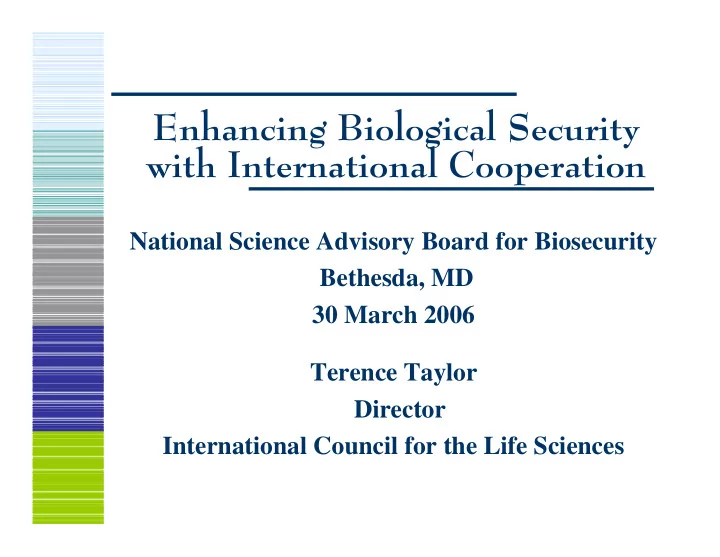

Enhancing Biological Security with International Cooperation National Science Advisory Board for Biosecurity Bethesda, MD 30 March 2006 Terence Taylor Director International Council for the Life Sciences
Getting the Balance Right � Extraordinary advances in life sciences and biotechnology bring enormous benefits to medicine, public health, and agriculture � But the risk to public safety and security from the misuse of this science and technology needs to be minimized by the engagement of the life sciences community 30 March 2006 Terence Taylor ICLS
Understanding the Risks Biological Risk spectrum � Naturally Occurring � Accidents/Misadventure � Lack of Awareness � Deliberate Misuse � The challenge is not just weapons or classifying some agents as dangerous pathogens 30 March 2006 Terence Taylor ICLS
Other Challenges � Lack of shared global language, risk assessment methodologies and standards in biosafety and biosecurity � Challenge to traditional multilateral institutions, individual scientific organizations and national governments 30 March 2006 Terence Taylor ICLS
International Council for the Life Sciences � Created in December 2005 to help enhance biological safety and security through international standards and the sharing of best practices � Product of over three years of engagement of the global life sciences community 30 March 2006 Terence Taylor ICLS
ICLS Mission The mission of the Council is to help ensure global public health, safety and security by safeguarding the opportunities offered by advances in the life sciences and their application through the promotion of best practices, standards, and codes of conduct. 30 March 2006 Terence Taylor ICLS
Global Awareness Dual Use vs. Misuse � Language choice is important � Port of Entry for Dialogue Matters � Ministry of Health, scientific professional societies, individual companies… � Level of mistrust for organizations dealing with issue from a biological weapons perspective � Sensitivities if exclusively viewed as security challenge 30 March 2006 Terence Taylor ICLS
Specific Concerns and Priorities Competing Issues � Commercial Interests � Desire to measure up to global standards perceived to be in the strategic interest of private business and governments � Basic health care – infectious disease � Agriculture and food production 30 March 2006 Terence Taylor ICLS
National Responses � United Kingdom � European Union � Singapore � India � Russia � Saudi Arabia 30 March 2006 Terence Taylor ICLS
Russia � G-8 Presidency � Infectious disease on the agenda for the July 2006 summit � Meeting of experts from G-8 countries in Moscow in April 2006 to discuss biosafety and biosecurity � Cooperative effort between the ICLS, governments, and research institutes 30 March 2006 Terence Taylor ICLS
Saudi Arabia “I came to the meeting from a country that is starting in this business … we do not have regulations in this area and we are in a grave need to start establishing rules and regulations…I hope we can stay in contact.” Representative, Molecular Virology and Infectious Diseases Research Section Saudi Arabian Food and Drug Authority 30 March 2006 Terence Taylor ICLS
Global Approaches � Biological and Toxin Weapons Convention � World Health Organization � G-8 and Global Partnership � Inter-Academy Panel � Global networks of life scientists 30 March 2006 Terence Taylor ICLS
World Federation for Culture Collections (WFCC) & Biosecurity � Highlighted the ICLS effort in its August 2005 newsletter � Acknowledges biosecurity as critical issue and specifically requested opinions on the topic from its members 30 March 2006 Terence Taylor ICLS
WFCC Position “It is important that a voice of reason be heard above the clamor that appears in the public media. Too often public policy is formulated in response to incomplete or inaccurate information. This is especially the case with biological agents and their potential use as weapons. This is affecting both the science as well as national scientific priorities. It is essential that the WFCC present a reasoned perspective in this issue.” 30 March 2006 Terence Taylor ICLS
Role of the ICLS � Help develop the necessary partnerships with policymakers, the public, academia and industry � Provides a forum and a focal point for the sustained engagement of the life sciences community 30 March 2006 Terence Taylor ICLS
ICLS - Creating Partnerships � Common global standards for Biosafety Levels 1, 2, 3 and 4 � Safety and security training curricula for personnel from academia, private industry and government � Global multi-disciplinary biological risk assessment 30 March 2006 Terence Taylor ICLS
Stakeholder Cooperation Academia Governments Private Public Industry Successful risk management requires cooperation among all the stakeholders 30 March 2006 Terence Taylor ICLS
Senior Advisory Panel Members � � Mikhail Paltsev Abdallah Daar University of Toronto Moscow Medical Academy and TEMPO � Robert Erwin � Charles Penn Large Scale Biology Corporation Syntaxin (UK) � Paul Fischer � George Poste GenVec Arizona Biodesign Institute, Arizona � William Haseltine State University Haseltine Associates � Una Ryan � Jerome Gervais AVANT Immunotherapeutics The Vaccine Fund � (France) Gurinder Shahi � Erling Myhre Global BioBusiness Initiative Lund University Hospital (Sweden) at USC (Singapore) � � Mark Smolinski Rainer Wessel Global Health and Security Initiative, GANYMED Pharmaceuticals Nuclear Threat Initiative (Germany) 30 March 2006 Terence Taylor ICLS
ICLS Charter & Membership Obligations � National and International Laws and Regulations � Personnel � Information � Safe and Secure Operation of Facilities � Governance of Research 30 March 2006 Terence Taylor ICLS
ICLS Contact Information International Council for the Life Sciences 1747 Pennsylvania Avenue, Suite 700 Washington, DC 20006 Tel: +1 (202) 659-1490 Fax: +1 (202) 296-1134 taylor@iclscharter.org 30 March 2006 Terence Taylor ICLS
Recommend
More recommend